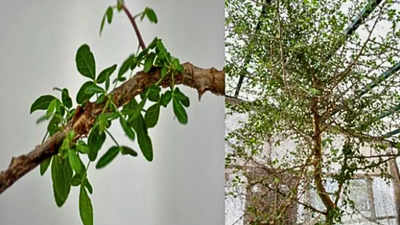- News
- Science News
- 'Sheba' tree, grown from a 1,000-year-old seed, shows promising anti-cancer qualities: Study
'Sheba' tree, grown from a 1,000-year-old seed, shows promising anti-cancer qualities: Study
A seed nearly a millennium old, dubbed "Sheba," has sprouted into a tree now standing at about 10 feet tall after being cultivated for 14 years. Unearthed during an archaeological dig in the Judean Desert in the late '80s, this seed is believed to date from between 993 and 1202 CE and may belong to an extinct biblical tree species.

Image source: 'Sheba' at different ages (Guy Eisner/Communications Biology)
Researchers speculate that this seed may have belonged to a tree species mentioned in biblical texts, specifically one that is now extinct but once flourished in regions corresponding to modern-day Israel, Palestine, and Jordan.
Possible anti-cancer benefits
The leaves of the "Sheba" tree have shown promising medicinal qualities. Chemical analysis reveals that they contain compounds that may have anti-inflammatory and anti-cancer properties. Researchers identified a series of glycolipid compounds in "Sheba's" resin that, to their knowledge, have not been reported elsewhere. These compounds will be tested for biological activity in future studies. Other related compounds, known as “guggultetrols,” found in the resin of Commiphora wightii have already shown potential anti-cancer activity. This discovery could provide valuable insights into ancient healing practices.
Healing powers
Scientists believe that the tree may produce "tsori," a resin mentioned in the Bible that is said to have healing properties. This tree is also linked to the Commiphora species, known for producing fragrant resins thought to be used in the Biblical perfume called "Balm of Gilead." Although initial theories suggested that "Sheba" could be a source of the historical "Judean Balsam," researchers have since ruled this out, noting that the tree does not have aromatic qualities.
End of Article
FOLLOW US ON SOCIAL MEDIA

